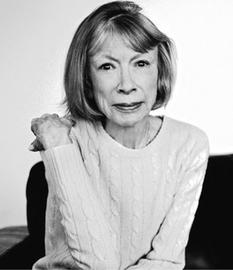 |
|
| Joan Didion (photo: Brigitte Lacombe) |
|
Joan Didion, author of fiction, commentary and memoir that for many defined "the fraying edges of postwar American life," as the New York Times put it, died on December 23 at age 87.
Shelley Wanger, her editor at Knopf, said, "Joan was a brilliant observer and listener, a wise and subtle teller of truths about our present and future. She was fierce and fearless in her reporting. Her writing is timeless and powerful, and her prose has influenced millions.
"She was a close and longtime friend, loved by many, including those of us who worked with her at Knopf. We will mourn her death but celebrate her life, knowing that her work will inspire generations of readers and writers to come."
She began her career working as an editor and writer at Vogue and contributing pieces to a variety of magazines. In 1963, she published her first novel, Run River.
Didion's first volume of essays, Slouching Towards Bethlehem, was published in 1968, and her second, The White Album, was published in 1979. Her nonfiction works include Salvador (1983), Miami (1987), After Henry (1992), Political Fictions (2001), Where I Was From (2003), We Tell Ourselves Stories in Order to Live (2006), South and West (2017), and Let Me Tell You What I Mean (2021).
Didion and her husband, writer John Gregory Dunne, collaborated on a variety of projects, including screenplays for The Panic in Needle Park (1971), Play It As It Lays (1972), which was Didion's second novel, A Star Is Born (1976), and Up Close and Personal (1996). Didion's other novels include A Book of Common Prayer (1977), Democracy (1984), and The Last Thing He Wanted (1996).
Her memoir The Year of Magical Thinking, written after Dunne's death, won the National Book Award for Nonfiction in 2005. Less than two years after Dunne's death, their daughter, Quintana Roo, died of acute pancreatitis, which Didion wrote about in her 2011 memoir, Blue Nights.
In 2005, Didion was awarded the American Academy of Arts and Letters Gold Medal in Belles Letters and Criticism. In 2007, she was awarded the National Book Foundation's Medal for Distinguished Contribution to American Letters. A portion of National Book Foundation citation read: "An incisive observer of American politics and culture for more than 45 years, Didion's distinctive blend of spare, elegant prose and fierce intelligence has earned her books a place in the canon of American literature as well as the admiration of generations of writers and journalists." In 2013, she was awarded a National Medal of Arts and Humanities by President Barack Obama, as well as the PEN Center USA's Lifetime Achievement Award.

